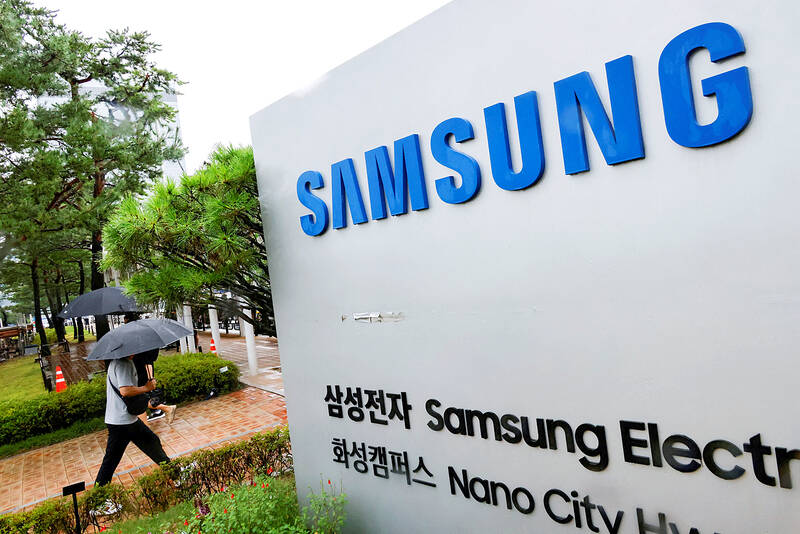South Korean exports have lost momentum so far this month, dimming this year’s outlook for an economy overshadowed by political turmoil and the potential impact of US President Donald Trump’s tariff plans.
The value of shipments adjusted for working-day differences decreased 2.7 percent from a year earlier for this month, data released yesterday by the customs office showed. That contrasts with a 7.7 percent rise initially reported for last month.
In headline figures distorted by more working days compared with last year, exports grew 16 percent, while overall imports increased 7.7 percent, resulting in a trade surplus of US$804 million. The Lunar New Year holidays came in January this year, whereas a year earlier they were in February.

Photo: Reuters
Exports to the US rose 16 percent and those to China increased 13.6 percent, according to customs data unadjusted for calendar differences.
Semiconductor shipments grew 22.1 percent, while automobile exports increased 40.3 percent.
Exports represent the biggest component of South Korea’s economy, led by shipments of semiconductors. A global rush to develop artificial intelligence technology has been a boon for companies such as SK Hynix Inc and Samsung Electronics Co that produce advanced memory chips.
Their outlook is turning increasingly gloomy after Trump unveiled a series of tax initiatives following his inauguration last month. The risk of a global trade war has become dangerously real after the president announced 25 percent levies on steel and aluminum imports that are to take effect next month, and reciprocal tariffs on numerous trading partners that are expected to hit in April.
“The uncertainty is extremely high and the primary cause is the impact of Trump’s tariff policies on [South] Korea’s export industries,” Korea Economic Research Institute researcher Lee Seung-suk said. “There are considerable concerns in sectors like steel and automobiles. Unless there are measures to ease the tariffs, a decline in exports this year seems inevitable.”
The trade risks add to concerns for an economy hamstrung by stagnant consumption and political turmoil that have weighed on consumer confidence. After suspended South Korean president Yoon Suk-yeol imposed martial law briefly in December last year, he was arrested on charges of insurrection, and the South Korean Constitutional Court is deliberating whether to finalize his ouster.
South Korea’s deputy trade minister visited Washington this week and asked the US to exclude his country from its tariff plans, a government statement said.
He highlighted a free-trade agreement in place between the two nations and stressed investments South Korea has made in the US, it said.
With headwinds for the economy intensifying, the Bank of Korea (BOK) last month cut its growth forecast for this year. The central bank’s board is set to meet for an interest rate decision next week. The BOK pivoted to an easing cycle with a rate cut in October last year and followed that with another reduction in November.
Weak export growth is a concern for the central bank given the economy’s heavy reliance on trade. South Korean companies are widely embedded across global supply chains, including automobiles, rechargeable batteries, shipbuilding and refined oil.

With this year’s Semicon Taiwan trade show set to kick off on Wednesday, market attention has turned to the mass production of advanced packaging technologies and capacity expansion in Taiwan and the US. With traditional scaling reaching physical limits, heterogeneous integration and packaging technologies have emerged as key solutions. Surging demand for artificial intelligence (AI), high-performance computing (HPC) and high-bandwidth memory (HBM) chips has put technologies such as chip-on-wafer-on-substrate (CoWoS), integrated fan-out (InFO), system on integrated chips (SoIC), 3D IC and fan-out panel-level packaging (FOPLP) at the center of semiconductor innovation, making them a major focus at this year’s trade show, according

DEBUT: The trade show is to feature 17 national pavilions, a new high for the event, including from Canada, Costa Rica, Lithuania, Sweden and Vietnam for the first time The Semicon Taiwan trade show, which opens on Wednesday, is expected to see a new high in the number of exhibitors and visitors from around the world, said its organizer, SEMI, which has described the annual event as the “Olympics of the semiconductor industry.” SEMI, which represents companies in the electronics manufacturing and design supply chain, and touts the annual exhibition as the most influential semiconductor trade show in the world, said more than 1,200 enterprises from 56 countries are to showcase their innovations across more than 4,100 booths, and that the event could attract 100,000 visitors. This year’s event features 17

SEMICONDUCTOR SERVICES: A company executive said that Taiwanese firms must think about how to participate in global supply chains and lift their competitiveness Taiwan Semiconductor Manufacturing Co (TSMC, 台積電) yesterday said it expects to launch its first multifunctional service center in Pingtung County in the middle of 2027, in a bid to foster a resilient high-tech facility construction ecosystem. TSMC broached the idea of creating a center two or three years ago when it started building new manufacturing capacity in the US and Japan, the company said. The center, dubbed an “ecosystem park,” would assist local manufacturing facility construction partners to upgrade their capabilities and secure more deals from other global chipmakers such as Intel Corp, Micron Technology Inc and Infineon Technologies AG, TSMC said. It

EXPORT GROWTH: The AI boom has shortened chip cycles to just one year, putting pressure on chipmakers to accelerate development and expand packaging capacity Developing a localized supply chain for advanced packaging equipment is critical for keeping pace with customers’ increasingly shrinking time-to-market cycles for new artificial intelligence (AI) chips, Taiwan Semiconductor Manufacturing Co (TSMC, 台積電) said yesterday. Spurred on by the AI revolution, customers are accelerating product upgrades to nearly every year, compared with the two to three-year development cadence in the past, TSMC vice president of advanced packaging technology and service Jun He (何軍) said at a 3D IC Global Summit organized by SEMI in Taipei. These shortened cycles put heavy pressure on chipmakers, as the entire process — from chip design to mass